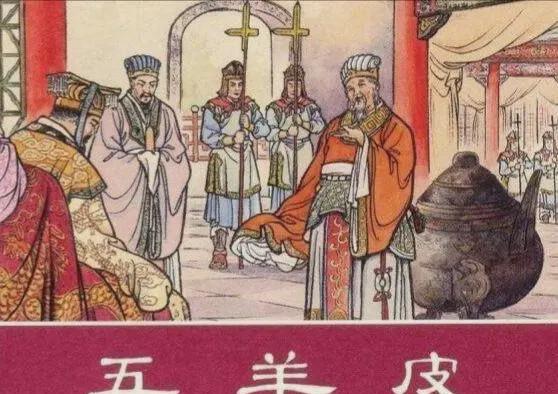
Qin Mugong proposed marriage to The Duke of Jin, but he got two talented people, thus advancing his cause of dominating Xi Rong.
These two people are Bai Li Xi and Uncle Jian.
Bai Lixi was the Grand Master of the State of Yu, who was captured when Duke Xian of Jin destroyed Yu, and Duke Xian sent him to the State of Qin as his daughter's dowry slave. At that time, in addition to accompanying a large number of goods and goods, there were also many male and female slaves, and these goods and slaves were called "concubines", and many of the bronze inscriptions in the Spring and Autumn Period were "concubines". Bai Lixi escaped on his way to Qin and ran to Wan (present-day Nanyang, Henan) to be captured by the Chu and became a slave of the Chu. Qin Mugong knew that Baili Xi had talent, and originally wanted to redeem it with heavy money, but he was afraid that the Chu people would not give it to him because of this, so he deliberately said that he was a worthless slave and was willing to redeem it with five ram skins. Bai Lixi was over 70 years old at the time, and there was little use as a slave, so the Chu people agreed. As soon as Bai Lixian entered the Qin kingdom, Mu Gong released him from his cage and talked with him about major state affairs, and it is said that after three days of talking, Mu Gong was very happy, so he entrusted him with state affairs and was named a doctor. Because it was bought from the Hands of the Chu people with five sheepskins, it was called the Five Sheep (Ram) Doctor.
It is said that when Bai Lixi was an official in the Qin Kingdom, his former wife heard that he was rich, so she came to him, and she was afraid that he would not recognize him, so she worked as a maid in his house to help with laundry. One day, Bai Lixi sat in the hall, and she "stroked the strings and sang" under the hall:
Baili Xi, five sheepskins. When reminiscing, cook the female, cook the latch (that is, the door latch). Today's rich and noble forgetfulness!
Bai Li Xi, when I first married me, I was five sheepskins, and I cooked chicken when I was separated. Today's rich and noble forgetfulness!
Baili Xi, Bai Li Xi, the mother is dead, buried Nanxi. The grave is covered with tiles and wood. Spring yellow quinoa, strangling chickens. West into Qin, five skins. Today the rich donate me for!
The piano sound is sad and poignant, and the lyrics are gentle and moving. Bai Li xi listened, knowing that it was his wife who had suffered together, and could not help but cry, busy to the church to recognize each other and share the joy of old age. Of course, this story is a legend, not necessarily a fact, but it reflects the praise of posterity for the virtue of Baili Xi.
Bai Lixi's character is indeed worthy of praise. Qin Mugong admired his talent and wanted to make him minister of state and entrust him with all the state affairs, but he did not accept it and recommended Uncle Sai. He vigorously praised Uncle Jian's political vision and ability in front of Mu Gong, and as soon as Mu Gong heard this, he invited Uncle Jian to the Qin State and made him Shangqing, with a status above Baili Xi. Together with Uncle Jian, Bai Lixi supported each other and jointly took charge of the great politics of the Qin State, making the Qin State soon stronger. Bai Lixi recommended talents, and Mu Gong chose to be able to do so, which was an important reason for him to gain hegemony.
At that time, Qin Mugong was not bound by the patriarchal system, breaking the "pro-kin" way of employing people and replacing it with the standards of "sage" and "talent". He boldly reused non-Qin people with moral integrity, in addition to the above-mentioned Baili Xi and Uncle Jian, there were also Pi Leopards from the Jin Dynasty, Suihui (士会), and Yu Yu from Rongdi. His generals Meng Mingshi, Bai Yibing, and Xi Qishu were not Qin. They all contributed to the strength and prosperity of the Qin state. Qin Mugong was able to become one of the five hegemons of the Spring and Autumn Period, in addition to the economic conditions of the Qin State, mainly because he was good at using people.